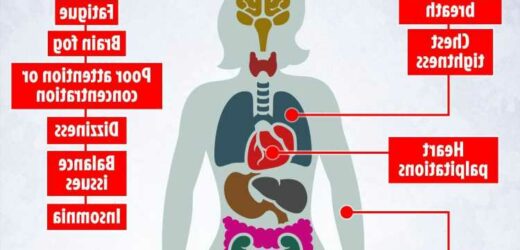LONG Covid can trigger more than 200 symptoms, doctors have discovered by questioning thousands of sufferers.
Researchers led by University College London found these debilitating problems affect 10 organ systems, including the brain, lungs and skin.
The most common symptom was fatigue, affecting almost every patient (98.3 per cent).
Following was post-exertional malaise (the worsening of symptoms after physical or mental exertion), affecting 89 per cent, and brain fog, medically known as cognitive dysfunction (85.1 per cent).
The top three most debilitating symptoms, affecting daily life, were fatigue, breathing issues and brain fog.
Long Covid manifests itself in a huge range of ways, including visual hallucinations, tremors, heart palpitations and memory loss.
Other problems flagged were sexual dysfunction, itchy skin, changes to the menstrual cycles, bladder control issues, shingles, diarrhoea and tinnitus.
And some of the least common and bizzarre were early menopause, change in penis size, "inability to yawn", "inability to cry", sensation of brain "on fire”, and aggression.
The study sheds more light on how coronavirus infection, which usually lasts for around two weeks, impacts some for months more.
Figures from the Office for National Statistics suggest one million people in the UK are currently battling the persistent symptoms.
🔵 Read our coronavirus live blog for the latest updates
This is rising fast in line with the growing third wave. Experts estimate 500 new cases of long Covid per day.
The ONS have estimated that one in seven people have some symptoms 12 weeks after a positive test result.
There are still many unknowns about “long haulers” – who is most at risk and how best to treat it, for example.
Senior author Dr Athena Akrami, a neuroscientist at the Sainsbury Wellcome Centre at UCL, said: “In this unique approach, we have gone directly to ‘long haulers’ around the world in order to establish a foundation of evidence…
“This is the most comprehensive characterisation of long Covid symptoms, so far.”
200+ symptoms
Almost 3,400 people with either confirmed or suspected Covid infection from 56 countries responded to an online survey.
From there, researchers identified a total of 203 symptoms in 10 organ systems, according to the findings published today in the Lancet’s EClinicalMedicine.
Dr Akrami said neurological symptoms were particularly prevalent.
"Memory and cognitive dysfunction, experienced by over 85 per cent of respondents, were the most pervasive and persisting neurologic symptoms", Dr Akrami said.
They were equally common across all ages, and with substantial impact on work.
Dr Akrami said: “Headaches, insomnia, vertigo, neuralgia, neuropsychiatric changes, tremors, sensitivity to noise and light, hallucinations, tinnitus, and other sensorimotor symptoms were also all common, and may point to larger neurological issues involving both the central and peripheral nervous system.”
Of the thousands of respondents, only 233 had said they had recovered.
Two-thirds (65 per cent) had been suffering for six months, and were still experiencing and average of 14 symptoms in month seven.
Agony for months
Along with the top three symptoms, the most common were sensorimotor symptoms (difficulting moving or feeling sensation), headaches, memory issues, insomnia, heart palpitations and muscle aches.
Some 96 per cent had persistent symptoms for at least 90 days (three months), plagued by an average of 17 symptoms.
The majority of participants (89 per cent) had “relapses”, mostly triggered by exercise, physical or mental activity, and stress.
Almost half (45 per cent) said they had cut down on their work hours, while over a fifth (22 per cent) were not working at all at the time of the survey.
The research team, who have all had or continue to have long Covid, fear there are many long haulers “suffering in silence”.
They are now calling for expanded clinical guidelines on assessing long Covid so that more diagnoses are made and a national screening programme, accessible to anyone who thinks they have long Covid.
Most read in Health News
EXTRA ZEST Combining lime with Viagra makes drug up to four times more potent
Major change to Covid booster jabs from Monday as PM set to ease restrictions
NHS rule change could see MILLIONS charged for prescriptions they now get for free
Find out how long after booster jab you get an accurate lateral flow result
It comes after a study reealed that only a minority of long Covid cases were being recorded by GPs.
Previous research estimated that as many as two million people in England are suffering ongoing symptoms.
But experts led by Oxford University found that only 23,273 cases (1 per cent) were formally recorded between February 2020 and April 2021 at GP practices.
The full list of long Covid symptoms
The list reads from highest prevalence to lowest, including “overall
- Fatigue
- Sensorimotor symptoms, overall
- Post-Exertional Malaise
- Cognitive dysfunction symptoms, overall
- Brain fog
- Sleep symptoms, overall
- Shortness of breath
- Headaches, overall
- Poor attention or concentration
- Tightness of chest
- Memory symptoms, overall
- Muscle aches
- Insomnia
- Heart palpitations
- Dizziness/vertigo/unsteadiness or balance issues
- Dry cough
- Difficulty thinking
- Short-term memory loss (memory that lasts 30 seconds, i.e. remembering a phone number before writing it down, or forgetting you’re in the middle of a task)
- Tachycardia
- Episodes of breathing difficulty/gasping for air with normal oxygen saturation
- Diarrhoea
- Sore Throat
- Elevated temperature (98.8-100.4 F)
- Anxiety
- Smell and taste symptoms, overall
- Difficulty with executive functioning (planning, organizing, figuring out the sequence of actions, abstracting)
- Chills/flushing/sweats
- Difficulty problem-solving or decision-making
- Pain/burning in chest
- Joint pain
- Loss of appetite
- Irritability
- Tingling/prickling/pins and needles sensation
- Speech and language symptoms, overall
- Nausea
- Waking up several times during the night
- Depression
- Skin sensations: burning, tingling, or itchiness without rash
- All reproductive
- Mood lability
- Difficulty finding the right words while speaking/writing
- Weakness
- Tearfulness
- Slowed thoughts
- Temperature lability
- Night sweats
- Tremors
- Headaches, behind the eyes
- Abdominal pain
- Difficulty falling asleep
- Apathy (lack of feeling, emotion, interest, or concern)
- Stiff neck
- Long-term memory loss (long-term memory can be anything from remembering yesterday, forgetting you’ve done a task, forgetting recently learned information, or forgetting your third-grade experience)
- All menstrual/period issues – with menstrual cycles
- Awakened by feeling like you couldn’t breathe
- Loss of smell
- Extreme thirst
- Blurred vision
- Numbness/loss of sensation
- Headaches, diffuse (entire brain)
- Lower esophagus burning / gastroesophageal reflux / acid reflux
- Sensitivity to noise
- Tinnitus
- Headaches, in the temples
- Vision symptoms, overall
- Sense of doom
- Loss of taste
- Coldness
- Vivid dreams
- Sensation of brain pressure
- Lump in throat/difficulty swallowing
- Muscle spasms
- Neuralgia (nerve pain)
- Itchy skin
- Sensitivity to light
- Feeling full quickly when eating
- Fever (>100.4 F)
- Runny nose
- Difficulty communicating verbally
- Vibrating sensations
- Changes to non-primary (second/third) language skills*
- Dry eyes
- Cough with mucus production
- Skin rashes
- Heat intolerance
- Changes in the voice
- Headaches, at the base of the skull
- Feeling like the world isn’t real (derealization) or Feeling like you aren’t real/like you’re observing yourself from outside your body (depersonalization)
- Low oxygen levels (<94%)*
- Abnormally irregular periods
- Eye pressure or pain
- Sneezing
- Ear pain
- Nightmares
- Electrical zaps/electrical shock sensation
- Altered sense of taste
- Waking up early in the morning
- Difficulty reading/processing written text
- Constipation
- Anger
- Bone ache or burning
- Itchy eyes
- Hyperactive bowel sensations
- Headaches/pain after mental exertion
- Difficulty processing/understanding what others say
- Migraines
- Phantom smells (imagining/hallucinating smells – smelling things that aren’t there)
- Difficulting speaking in complete sentences
- Changes to the ear canal (such as pressure, blockage, burning, swelling)
- Low temperature
- Changes in sensitivity to medication
- Abnormally high blood pressure
- Floaters
- Abnormally heavy periods/clotting
- Altered sense of smell
- Visibly inflamed/bulging veins
- Other menstrual issues
- Acute (sudden) confusion/disorientation
- Petechiae (tiny purple, red, or brown spots on the skin, usually on arms, legs, stomach, buttocks, and occasionally inside mouth or on eyelids)
- Restless leg syndrome
- Bradycardia (low heart rate, <60 beats per minute)
- Rattling of breath
- Difficulty communicating in writing
- Other sleeping issues symptoms
- Sexual dysfunction (nonbinary)
- Slurring words/speech
- Other temperature problems
- Hallucinations, overall
- Bloodshot eyes
- Lucid dreams (dreams where you are aware you are dreaming or have some control over what you dream about)
- Thoughts moving too quickly
- Urinary issues, other
- Pink eye (conjunctivitis)
- Sexual dysfunction (cis men)
- Vomiting
- Bladder control issues
- Other memory symptoms
- Seeing things in your peripheral vision
- COVID toes (discoloration, swelling, painful, or blistering toes)
- Peeling skin
- Headaches, other
- Fainting
- Numbness/weakness on one side of the body only
- Other ear/hearing issues
- Other eye issues
- Sensation of brain warmth/”on fire”
- Heightened reaction to old allergies
- Forgetting how to do routine tasks (tying your shoe laces, washing your hands)
- Impulsivity and disinhibition
- Abnormally low blood pressure
- Suicidality
- Pain in testicles (cis men)
- Visual (seeing) hallucinations
- Other skin and allergy symptoms
- Other
- Brittle/discolored nail
- New allergies (food, chemical, environmental, etc)
- Agnosia (failure to recognize or identify objects despite intact sensory functioning)
- Phantom taste (imagining/hallucinating tastes – tasting things when there’s nothing in your mouth)
- Speaking unrecognizable words
- Hearing loss
- Other cognitive functioning symptoms
- Heightened sense of smell
- New allergies (food, chemical, environmental, etc) (weeks/months)
- Redness on the outside of eyes
- Sensation of facial pressure/numbness, left side
- Sexual dysfunction (cis women)
- Dermatographia (writing on your skin causes red lines where you scratched)
- Aggression
- Inability to make new memories
- Sleep apnea
- Double vision
- Sensation of facial pressure/numbness, right side
- Inability to yawn
- Auditory (hearing) hallucinations
- Other speech/language Symptoms
- Other emotional changes symptoms
- Sensation of facial pressure/numbness, other area
- Coughing up blood
- Itchy, other
- Euphoria (a feeling or state of intense excitement and happiness)
- Other semen/penis/testicles issues (cis men)
- Inability to cry
- Numbness/loss of sensation in/near the ear
- All menstrual/period issues – post-menopausal and no/other menstrual cycles
- Post-menopausal bleeding/spotting (cis women over 49)
- High blood sugar (if measured)
- New/unexpected anaphylaxis reaction
- Blood clots (Thrombosis)
- Hypomania (a milder form of mania)
- Facial paralysis
- Tunnel vision
- Decrease in size of testicles/penis (cis men)
- Pain in testicles (nonbinary)
- Tactile (touch) hallucinations
- Early menopause (cis women in 40s)
- Delusions
- Shingles
- Seizures (suspected)
- Heightened sense of taste
- Mania (abnormally elevated/excited mood, decreased need for sleep, occasionally with delusions)
- Hallucinations, other
- Low blood sugar (if measured)
- Decrease in size of testicles/penis (nonbinary)
- Other semen/penis/testicles issues (nonbinary)
- Post-menopausal bleeding/spotting (cis women in 40s)
- Total loss of vision
- Seizures (confirmed)
- Early menopause (cis women under 40)
Source: Read Full Article








